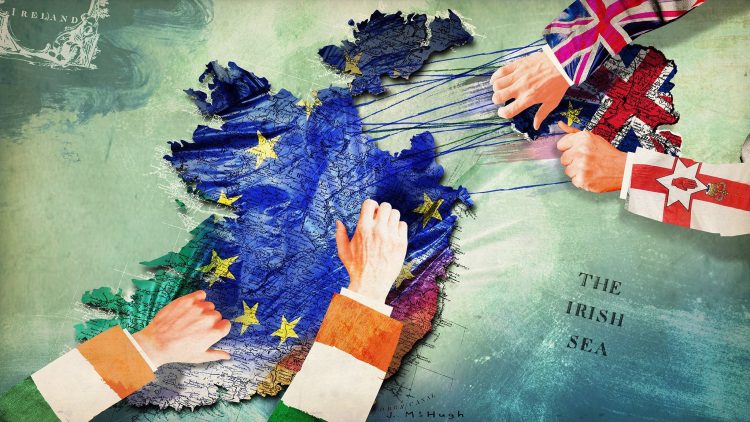The recent NI Life & Times survey indicated that almost two-thirds of people in Northern Ireland believe that Brexit has increased the likelihood of Irish Reunification
It is essential that In May 1921, the island of Ireland was split in two, giving rise to Northern Ireland as part of the UK and to what would become the independent Republic of Ireland. A century later, the idea that reunification could happen one day has taken on new life. There’s little prospect of the referendum that would be held shortly. Still, shifting demographics and the forces unleashed by Brexit suggest a ballot one day is possible — assuming the British government chooses to have one.
Suppose a border poll about Irish reunification was held today, given recent survey results. In that case, a majority of people in Northern Ireland might—by a tiny margin—vote for a united IrelandMay election brought, for the first time, an Irish nationalist party to the head of Northern Ireland’s government, with Sinn Fein—the former political wing of the IRA—taking the most number of seats. Effectively, the presumptive first minister of Northern Ireland’s government does not believe Northern Ireland should exist. Sinn Fein has vowed to push for the border poll.
It seems the ceding of Northern Ireland from the UK and ensuing Irish reunification have become “inevitable.”
A recent “poll” compiled by Liverpool University measured 48 per cent support for the Union among the Northern Ireland electorate, as compared to 35 per cent for a United Ireland, a result described by the university’s Professor Jonathan Tonge as indicative of “two decades of slippage” for Unionism.
The North has eight unionist MPs, nine pro-United Ireland MPs and 1 Alliance MP. United Ireland MPs represent every inch of the 310-mile border. If we take the number of MPs as a measure, then time for a border poll. Unionists have lost their majority in Council, Assembly, and Westminster elections. Their story is one of decline in every single election.
After every election, the Union gets weaker and the pro-unity case stronger. To be clear, we are now well past the point where a majority any longer exists for the Union
In the recent Assembly elections, the number of votes for parties and independent candidates choosing a pro-UK position was 363,891 (42.1%). The number backing pro-Irish unity is 358,768 (41%). A difference of just 5,123 (1.1%). 140,0550 (16.2%) of the electorate-backed parties like Alliance, Greens and a slew of independents are currently agnostic on the constitutional question.
The Sinn Fein president said preparations for a referendum on Irish reunification should begin. She previously told the party would work towards holding a border poll within the next five years
Mrs McDonald said her priority was that preparations for a border poll should begin and added that those conversations needed to include unionists in Northern Ireland. Sinn Fein recently topped the vote in the Northern Ireland Assembly elections for the first time. Several opinion polls have shown the Republican party with a lead among decided voters in the Republic. McDonald said: “There will have to be two referendums in both North and South jurisdictions.
The Sinn Fein president further emphasized, “At this point, the big priority for me and us is that preparation for such a referendum is underway. Whatever the answer to that question, be in no doubt that change, positive change, exciting change, progressive change, is underway in Ireland.” “It is good news for Britain also because parts of the whole project of building a new island are building, renewing, consolidating that relationship we have with our nearest neighbour,” said McDonald.
Preparations for a Border poll are “premature, hasty and divisive.”
The Fine Gael TD and former minister for justice and foreign affairs Charlie Flanagan has said that there was “little evidence” that a poll in the North would produce a majority for reunification and even doubt that a vote would pass in the Republic. But the Sinn Féin first minister designates Michelle O’Neill again called on the Government in Dublin to prepare for a Border poll and the island’s reunification.
While Irish nationalists control Stormont, Scots want an independence vote; Welsh is making noises
In Northern Ireland, the nationalist Sinn Fein party, whose whole raison d’etre is the reunification of the island of Ireland into a single state, has been basking in electoral success since May 6. It became the largest party in the Northern Ireland Assembly — the first time since Britain carved off the six counties as the other 26 counties to the south became the then Irish Free State a century ago. It seems that it’s only a matter of time before a so-called border poll on whether Northern Ireland should reunify with the Irish Republic. That border poll — a once-off opportunity — is enshrined as a critical element of the Good Friday Agreement that ended three decades of political and sectarian violence there.
Momentum for a vote has been growing partly because of Brexit
In a 2016 referendum, 52% of people in the UK voted to leave the European Union, but 56% of Northern Irish voters supported remaining. As in Scotland, where a majority also backed EU membership, being forced out of the 27-nation bloc stirred nationalist sentiment. Scotland’s government is pushing for another referendum on leaving the UK, a grouping of four distinct nations, including England and Wales.
Consent for reunification is required on both sides of the border under the terms of the Good Friday Agreement
meaning a referendum would take place in the Republic, too. Polls in the south consistently back unity. An Irish Times-commissioned survey in December 2021 found 62% of respondents favoured a united Ireland, 16% were against, and 13% were undecided. Few if any polls in Northern Ireland have indicated a majority supporting reunification. An Irish News survey in April showed only 32% of respondents in the North would vote for a United Ireland, with 48% against. Support fell further if voters there had to pay higher taxes for unity. Still, a significant proportion of the electorate has yet to decide which way to vote in a border poll.






























What’s up, yeah this post is genuinely nice and I have learned lot of things
from it about blogging. thanks.